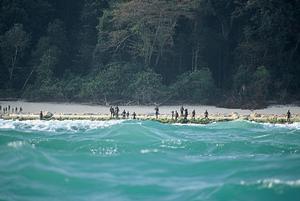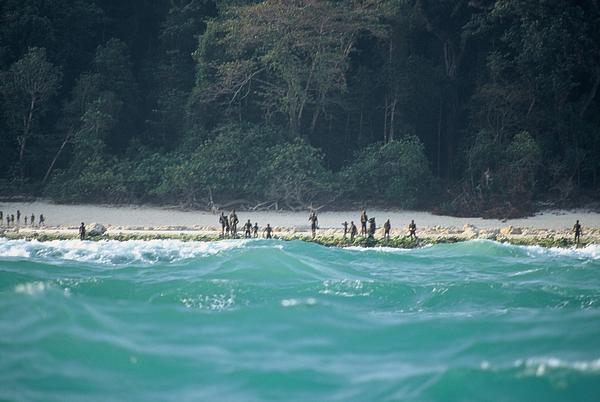In a recent incident that has drawn significant media attention, an American tourist named Mykhailo Viktorovych Polyakov found himself at the center of a controversy after he allegedly attempted to establish contact with one of the world’s most isolated tribes, the Sentinelese. This arrest not only raises ethical questions regarding the interactions of outsiders with indigenous people but also brings to light the broader implications of tourism on isolated communities.
The Events Leading to the Arrest
The incident occurred on March 29, 2023, when 24-year-old Polyakov journeyed to North Sentinel Island, part of the Andaman and Nicobar Islands in the Bay of Bengal, roughly 750 miles from the Indian mainland. According to Indian police, he embarked on this illegal expedition equipped with an inflatable boat, a bottle of Diet Coke, a coconut as an offering, and a GoPro camera for documenting the encounter.
Upon arrival, Polyakov reportedly scanned the shoreline with binoculars and found no immediate sign of the tribe. In an apparent attempt to establish contact, he left behind his offerings and collected sand samples. Following his return to Port Blair, authorities apprehended him on March 31.

Legal and Ethical Implications of the Journey
The Indian government has established strict laws prohibiting access to North Sentinel Island in an effort to protect the Sentinelese people and their way of life. This ban is enforced to prevent the tribe’s exposure to common diseases against which they have no immunity. The actions of Polyakov have been met with condemnation from various quarters, especially from indigenous rights organizations.
Caroline Pearce, Director of Survival International, expressed grave concerns over the incident, labeling Polyakov’s actions as both “reckless and idiotic.” She emphasized that such attempts jeopardize not only the individuals involved but also the lives of the entire tribe. The duration of this troubling narrative fits within a growing trend of outsiders attempting to engage with uncontacted tribes around the globe, typically driven by a mix of adventure, curiosity, or the influence of social media.
The Sentinelese Tribe: A Brief Overview
The Sentinelese are recognized as one of the most isolated groups in the world, living on North Sentinel Island. Due to their seclusion, little is known about their population, estimated to be between 20 to 400 members. They are hunter-gatherers, subsisting primarily on hunting, fishing, and foraging, which they pursue using traditional methods and tools such as bows and arrows.
Historically, contact with the Sentinelese has rarely ended well for outsiders. Instances from the past have included tragic outcomes, most notably the death of American missionary John Allen Chau in 2018, after he attempted to convert them to Christianity. These events underline the risks both to the individual and the tribe, emphasizing the necessity of maintaining their isolation.
The Global Context of Indigenous Rights
This incident reflects a broader issue surrounding the rights of indigenous peoples and the ongoing threats they face from external influences. Survival International has consistently advocated for the protection of isolated tribes, calling on governments to respect their autonomy and territorial rights. The plight of uncontacted tribes is echoed in various reports of invasions into their lands worldwide, from the Amazon rainforest to the Pacific islands.
With increasing globalization and tourism, the risk to these populations grows. Many tribes are particularly vulnerable to diseases that could decimate their communities in a matter of days. As such, the responsibility falls upon governments and international organizations to implement and uphold laws that protect these populations from exploitation and intervention.
Potential Legal Consequences for Polyakov
As of now, Polyakov has not been formally charged, but his actions may lead to significant consequences under Indian law. The prohibition against approaching North Sentinel Island is rooted in the need to safeguard the indigenous population, and violators may face fines, imprisonment, or other legal actions. Legal experts suggest that the outcome of this case will hinge heavily on the investigations by Indian police and any evidence collected regarding his intentions.
The Impact of Social Media and Modern Adventure Tourism
The fallout from incidents like Polyakov’s expedition invites renewed calls for comprehensive measures to enhance protections for isolated communities. Activists highlight the need for stronger legislation that not only enforces existing bans but also raises awareness about the consequences of contact.
Polyakov’s case raises critical questions about the influence of social media and adventure tourism on perceptions of engagement with uncontacted tribes. In an era where the viral nature of experiences fuels a desire for uniquely personal adventures, the line between exploration and exploitation becomes obscure.The fallout from incidents like Polyakov’s expedition invites renewed calls for comprehensive measures to enhance protections for isolated communities. Activists highlight the need for stronger legislation that not only enforces existing bans but also raises awareness about the consequences of contact.Furthermore, local and global entities working towards the preservation of indigenous cultures must collaborate actively to create educational campaigns that foster respect and understanding of uncontacted tribes. The preservation of such distinct cultures is paramount—not just for the tribes themselves but for humanity as a whole.
Conclusion
The recent arrest of Mykhailo Viktorovych Polyakov serves as a poignant reminder of the delicate balance between curiosity and respect for indigenous rights. As globalization continues to encroach upon even the most isolated communities, the imperative to protect those cultures has never been more pressing. The responsibility lies not only with tourists but also with governments, organizations, and society at large to uphold the dignity and safety of indigenous populations.
“It’s imperative that we recognize and uphold the sovereign rights of isolated tribes to exist without the threat of external influences.”
In closing, ensuring the Sentinelese and other uncontacted tribes are protected from incursion is not merely a legal obligation but a moral one, vital for the preservation of human diversity and cultural richness.

